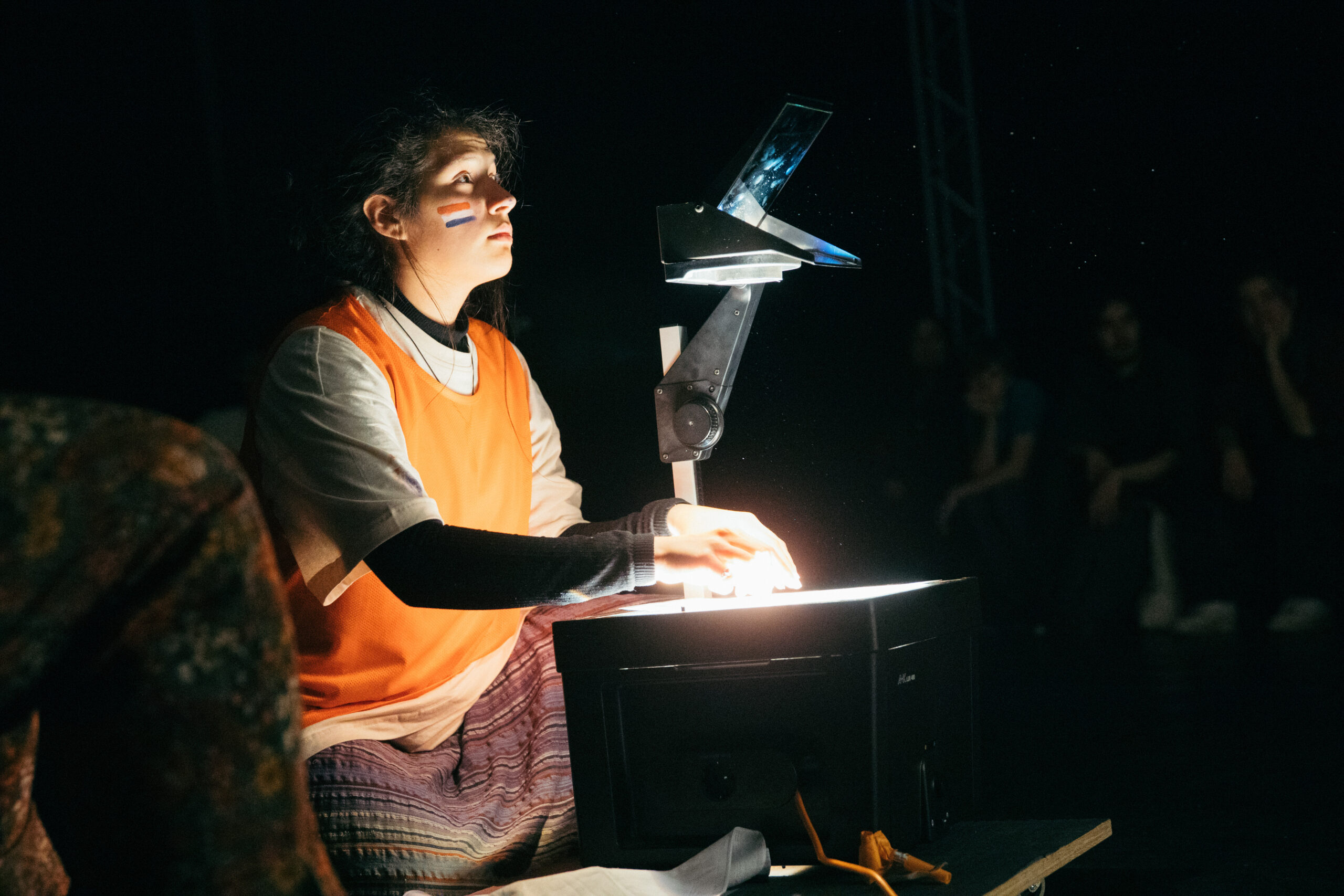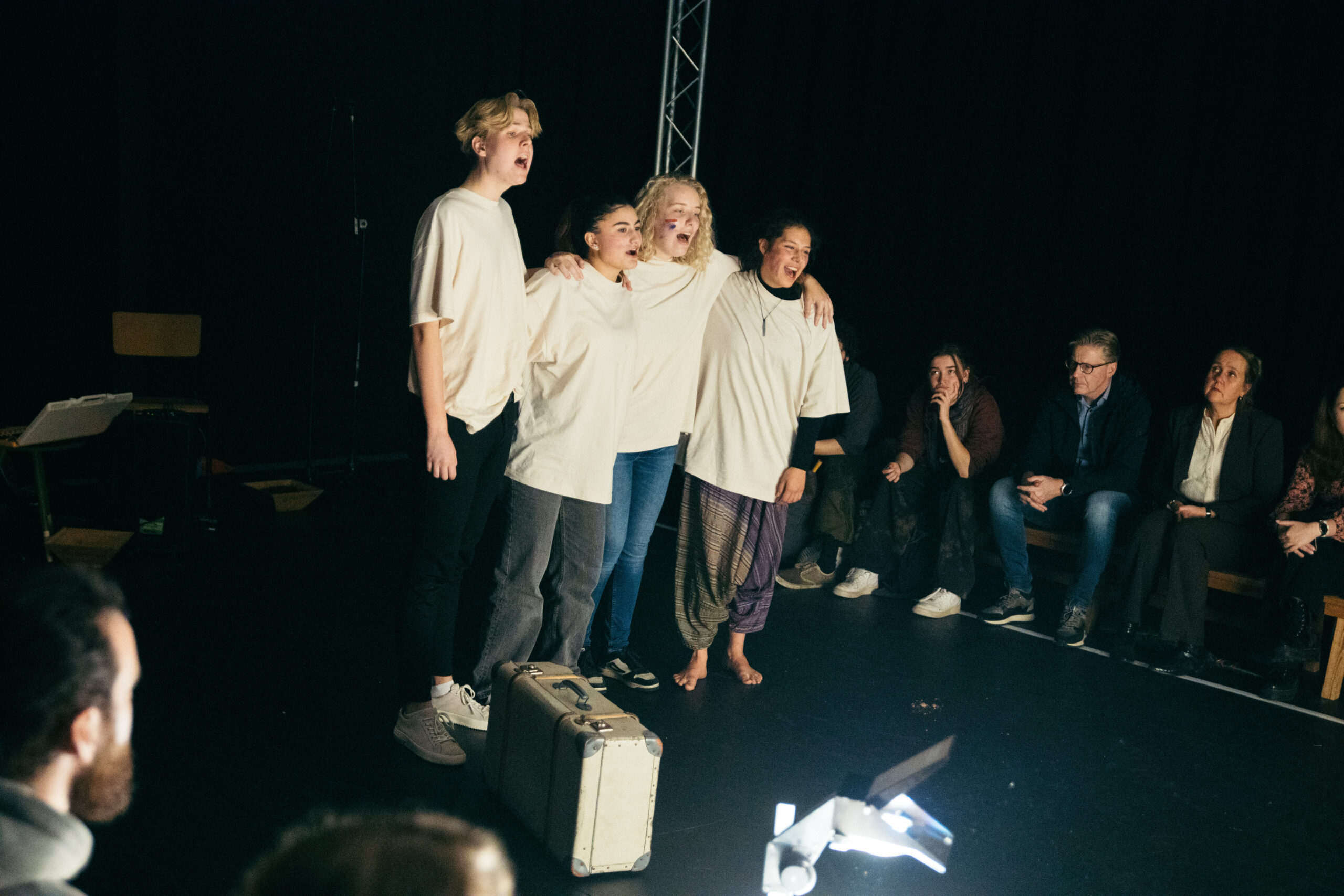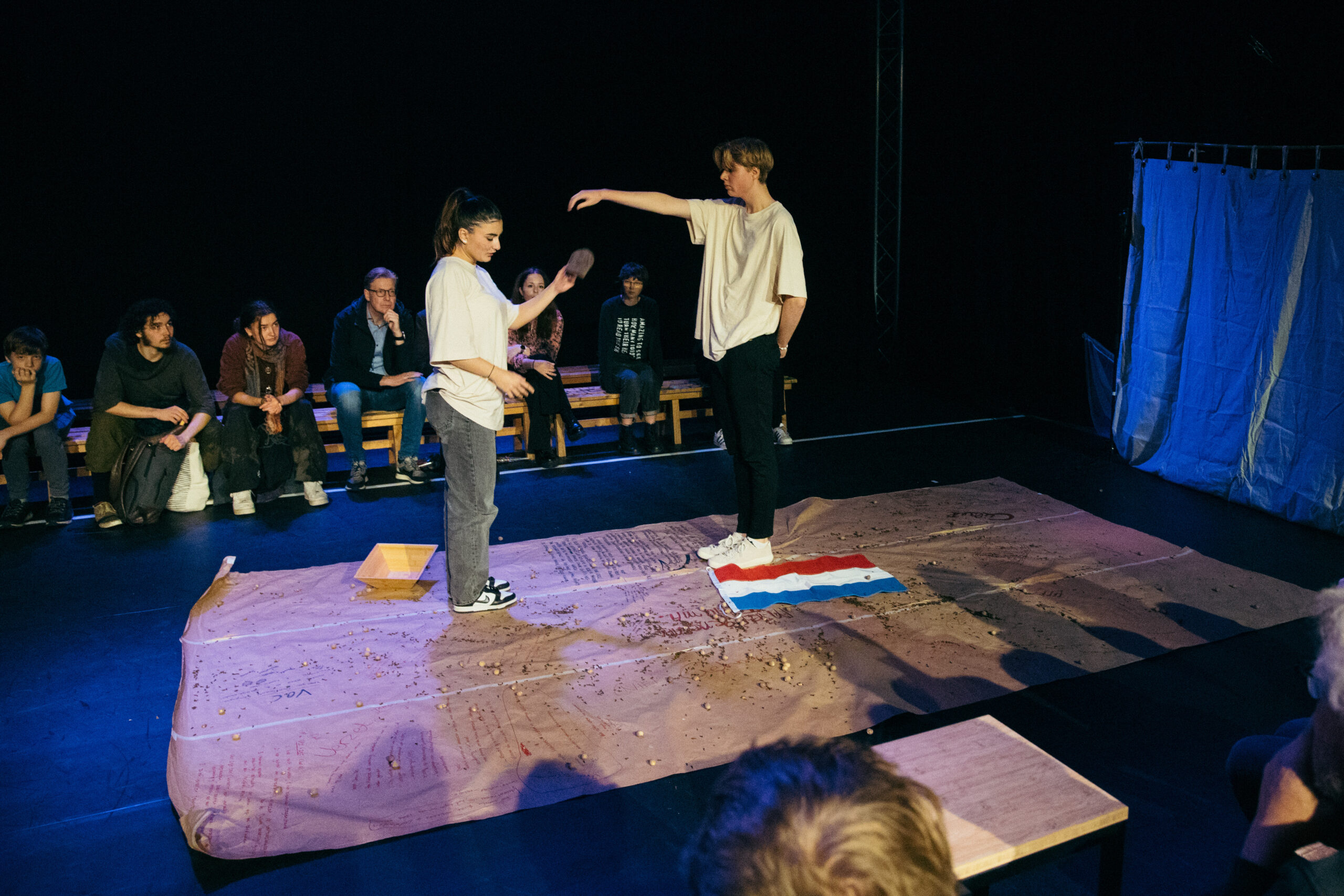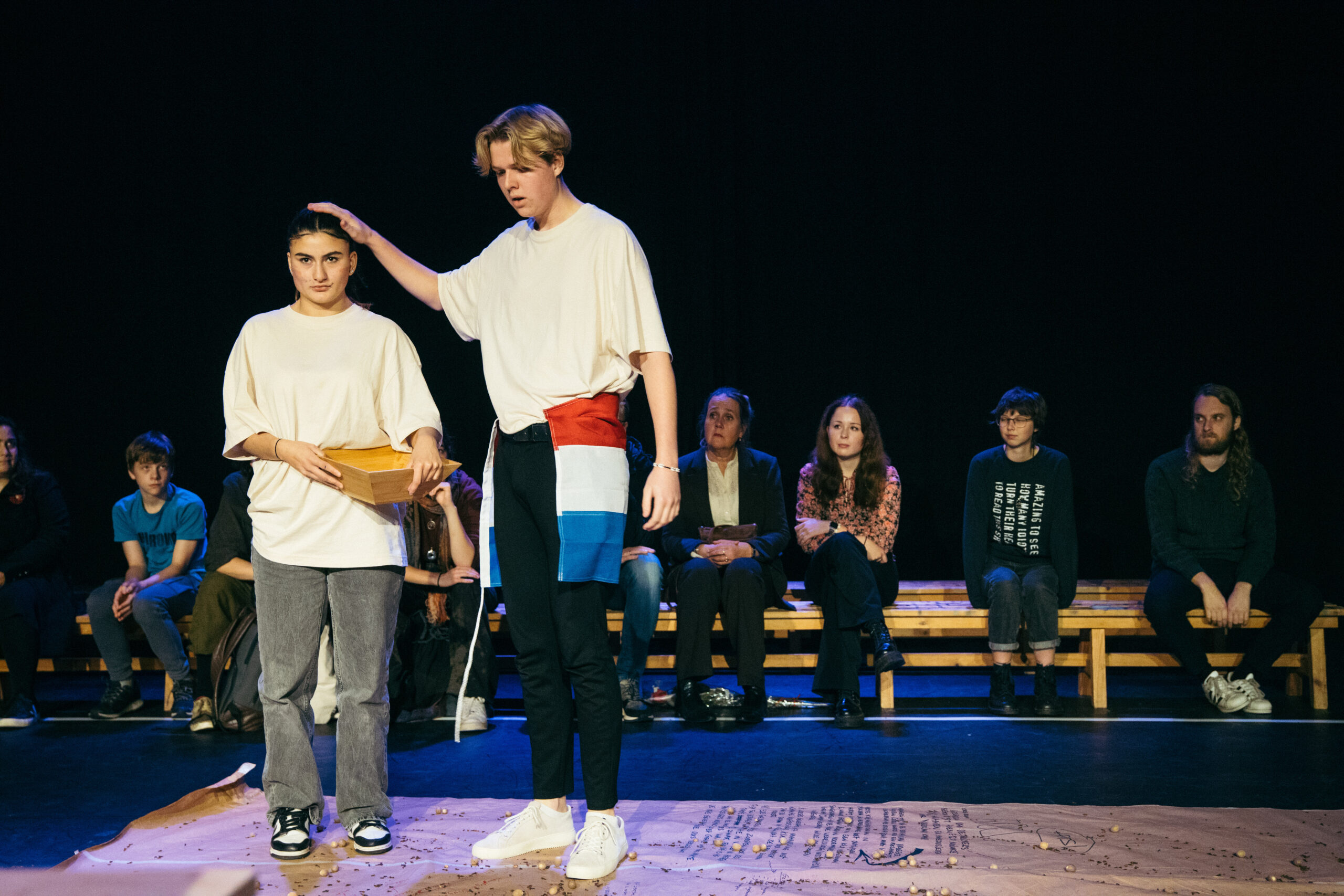Resistance
[English below]
RESISTANCE! – Youth Festival of Modern European History is een internationale uitwisseling van jongeren, nieuwe makers, historici en organisaties uit Slovenië, Italië, Frankrijk, Portugal, Tsjechië en Nederland.
Resistance start in 2023 en eindigt december 2024.
Samen met een groep jongeren maakt elke deelnemende organisatie een performance of andere kunstuiting waarin een belangrijke historische gebeurtenis centraal staat. Een gebeurtenis die heeft gezorgd voor een grote beweging in het desbetreffende land. Deze performances gaan op tournee naar alle zes partnerlanden. De jongeren doen tijdens dit project niet alleen ervaring op met theatermaken, maar krijgen ook nieuwe perspectieven op historische gebeurtenissen in Europa.
Onderwerpen van de partnerlanden
Tsjechië: De Praagse lente in 1968
Frankrijk: Mei ‘68
Portugal: De Anjerrevolutie 1974
Slovenië: Het uiteenvallen van SFR Joegoslavië
Italië: Verzet en wraak
Nederland: Verzetsdaden van Molukkers in Nederland
This project has been funded with support from the European Commission, Citizens, Equality, Rights and Values programme.
This communication reflects the views only of the author, and the Commission cannot be held responsible for any use which may be made of the information contained therein.

Resistance! Atelier
Tijdens ons nieuwste Grenzeloos project ‘Resistance! A Youth Festival of Modern European History’ verdiepen jongeren zich in de verzetsgeschiedenis van Molukkers in Nederland. Samen met theatermaker Fiona Kelatow deden zij in september en oktober onderzoek binnen de Molukse gemeenschap in Deventer: ze doken de boeken in, keken documentaires, bezochten de kerk, gingen in gesprek met de Molukse gemeenschap en verzamelden hun verhalen.
De jongeren maakten kennis met een hele groep mensen en hervertelden het verhaal van de Molukkers vanuit de nieuwe generatie. Het resultaat is een bijzondere voorstelling die een eerlijke kijk en een mooie representatie geeft van de Molukse gemeenschap in Nederland. De try-out van Resistance! Atelier vond plaats op vrijdag 27 oktober 2023 in de theaterzaal van het Theaterschip.
‘Resistance! A Youth Festival of Modern European History’ is een internationale uitwisseling van jongeren, nieuwe makers, historici en organisaties uit zes verschillende landen. Samen met een groep jongeren maakt elke deelnemende organisatie een performance of andere kunstuiting waarin een belangrijke historische gebeurtenis centraal staat. In 2024 gaat het werk dat de jongeren gemaakt hebben op tournee langs de 5 samenwerkingspartners van dit project in Slovenië, Tsjechië, Portugal, Frankrijk en Italië.
Planning
Resistance! Atelier
Maandag 25 september 18:30 – 21:30u: onderzoek
Maandag 2 oktober 18:30-21:30u: onderzoek
Maandag 9 oktober 18:30-21:30u: onderzoek
Maandag 16 oktober 18:30-21:30u: onderzoek
23 – 27 oktober (herfstvakantie): maakweek met elke dag repetities en op 27 oktober een try-out voor publiek
Resistance! Tournee
voorjaar 2024: uitwisseling naar Italië (DELLEALI)
voorjaar 2024: uitwisseling naar Portugal (Teatro Circo de Braga)
zomer 2024: uitwisseling naar Frankrijk (Pelican Theatre)
najaar 2024: uitwisseling naar Tsjechië (National Moravian-Silesian Theatre)
najaar 2024: uitwisseling in Deventer (Theaterschip)
najaar 2024: uitwisseling naar Slovenië (Glej Theater)


Resistance Redux
‘Resistance Redux’ toont een visuele, muzikale en fysieke interpretatie van de geschiedenis van de Molukkers in Nederland. In een kwartier leiden de jonge acteurs het publiek door deze geschiedenis en de ontwikkeling van hoe wij deze geschiedenis waarnemen. Het verleden van de Molukkers is nog steeds voelbaar in het heden, ook al zijn veel Nederlanders zich daar niet helemaal van bewust.
De jongeren deden onderzoek naar dit verleden en spraken met Nederlandse Molukkers van de eerste, tweede en derde generatie, waarvan de laatste van hun eigen leeftijd is. Al deze gesprekken waren verschillend qua context en emotie. Veel van deze verhalen en de gevoelens die daarmee gepaard gaan, waren nieuw voor de deelnemers van dit project. Ze probeerden de gevoelens van een hele bevolking die niet werd gehoord te begrijpen.
Na dit onderzoek probeerden de jongeren erachter te komen hoe ze zich tot deze informatie konden verhouden, en brachten hun eigen persoonlijke verbinding tot stand met een geschiedenis waarvan ze nu beseften dat deze gedeeld is. Dit alles zorgde ervoor dat de jongeren samen met hun regisseur een energieke voorstelling hebben gemaakt, beïnvloed door Molukse culturele elementen, die een grote verscheidenheid van deze perspectieven laat zien.
Credits
Mentor en regisseur: Fiona Kelatow
Concept en spel: Olivier Schulenburg, Thirza Nijsink, Nutsa Lomsadze (Italië en Portugal)
Lotte van ‘t Veld, Norah van Leeuwen, Bente van Huffelen (Frankrijk)
Artistieke begeleiding: Chris de Vries
Productie: Nienke Schoemaker
Historische context
Toen de Nederlandse VOC specerijen op de Molukken ontdekte, koloniseerden zij de eilanden die nu Indonesië heetten. Gedurende deze tijd werd de lokale bevolking op brute wijze vermoord en werden de specerijen naar Europa verscheept. Na drie eeuwen koloniale onderdrukking en na de Tweede Wereldoorlog verklaarde Indonesië zich onafhankelijk. De Molukse bevolking kiest grotendeels de kant van Nederland en vecht in hun leger (KNIL) tegen Indonesië met het idee de eigen eilanden terug te krijgen.
Toen de VN verklaarde dat Indonesië onafhankelijk moest worden, ontstond er een bedreigende situatie voor de Molukse militairen die aan Nederlandse zijde hadden gevochten. Als tijdelijke oplossing werden Molukse militairen en hun gezinnen naar Nederland gehaald. Het idee was om hen na een paar maanden naar huis te laten terugkeren als de situatie in Indonesië weer veilig zou zijn.
Omdat er niet genoeg huizen waren om de 12.500 mensen te huisvesten, werden ze in barakken en kazernes ondergebracht. De levensomstandigheden waren zeer slecht en de Molukkers kregen geen kans op integratie in de Nederlandse samenleving omdat de regering vasthield aan het feit dat hun verblijf slechts tijdelijk was. De belofte om naar huis terug te keren naar de Molukken werd nooit waargemaakt. De manier waarop de Nederlandse regering de Molukkers behandelde, creëerde gevoelens van isolement, onbegrip en weerstand die tot verschillende conflicten leidden.

Resistance
RESISTANCE! – Youth Festival of Modern European History is an international exchange of youngsters, new theatre makers, historians and organizations from Slovenia, Portugal, Czech Republic, France, Italy and the Netherlands.
Resistance! starts in 2023 and ends in December 2024.
Together with a group youngsters, every organization will make a performance around an important historical event from their national history, which has caused movement within their country. All performances will tour around the six partner countries. Besides gaining experience in theatre making during this project, the youngsters will also gain new perspectives of historical events within Europe.
Topics of the partner countries
Czech Republic: The Prague Spring in 1968
France: May ‘68
Portugal: The Carnation Revolution 1974
Slovenia: Disintegration of SFR Yugoslavia
Italy: Resistance and Revenge
Netherlands: Acts of resistance of Moluccans in the Netherlands
This project has been funded with support from the European Commission, Citizens, Equality, Rights and Values programme.
This communication reflects the views only of the author, and the Commission cannot be held responsible for any use which may be made of the information contained therein.

Resistance! Atelier
During our newest Grenzeloos project ‘Resistance! A Youth Festival of Modern European History’ youngsters dive into the resistance history of Moluccans in the Netherlands. Together with theatre maker Fiona Kelatow, they conduct research within the Moluccan community in Deventer in September and October of this year. They delved into the books, watched documentaries, visited the church, talked to the Moluccan community and collected their stories.
The youngsters got to know a whole group of people and retold the story of the Moluccans from the perspective of the new generation. The result is a special performance that gives an honest view and a beautiful representation of the Moluccan community in the Netherlands. The try-out of Resistance! Atelier took place on Friday 27 October 2023 at the Theaterschip.
‘Resistance! A Youth Festival of Modern European History’ is an international exchange of youngsters, new theatre makers, historians and organizations from six different countries. Together with a group youngsters, every organization will make a performance around an important historical event from their national history, which has caused movement within their country. In 2024, the work they create will tour around Europe to our 5 partners in Slovenia, Czech Republic, Portugal, France and Italy.
Planning
Resistance! Atelier
Monday 25 September 18:30 – 21:30u: research
Monday 2 October 18:30-21:30u: research
Monday 9 October 18:30-21:30u: research
Monday 16 October 18:30-21:30u: research
23 – 27 October (autumn break): repetition week + try-out on 27 October
Resistance! Tournee
spring 2024: exchange to Italy (DELLEALI)
spring 2024: exchange to Portugal (Teatro Circo de Braga)
summer 2024: exchange to France (Pelican Theatre)
autumn 2024: exchange to Czech Republic (National Moravian-Silesian Theatre)
autumn 2024: exchange in Deventer (Theaterschip)
autumn 2024: exchange to Slovenia (Glej Theater)


Resistance Redux
‘Resistance Redux’ shows a visual, musical and physical interpretation of the history of Moluccans in the Netherlands. In fifteen minutes, the young actors guide the audience through this history and the development of how we perceive this history. The past of the Moluccans is still sensible in the present, even though many of the Dutch citizens are not fully aware.
The youngsters researched this past, and spoke to Dutch-Moluccan People of the first, second and third generation, last of whom is of their own age. All of this conversations were different in context and emotion. Many of these stories and the feelings that come with them, were new to the participants of this project. They made an attempt to understand the feelings of a whole population being unheard.
After this research, they tried to find out how to relate themselves to this information, and established their very own personal connection with a history they now realized is a shared one. All this led the youngsters and their director to create an energetic performance, influenced by Moluccan cultural elements, that shows a wide variety of these perspectives.
Credits
Mentor and director: Fiona Kelatow
Performers: Olivier Schulenburg, Thirza Nijsink, Nutsa Lomsadze (Italy and Portugal)
Lotte van ‘t Veld, Norah van Leeuwen, Bente van Huffelen (France)
Artistic supervision: Chris de Vries
Production: Nienke Schoemaker
Historical context
When the Dutch VOC discovered spices on the Moluccan Islands, they colonised the islands now known as Indonesia. During this time the local population was brutally murdered and the spices were shipped to Europe. After three centuries of colonial oppression and after the second world war, Indonesia declared their independence. The Moluccan population largely choose the side of the Netherlands, fighting in their army (KNIL) against Indonesia with the idea of getting their own islands back.
When the UN declared that Indonesia should be independent, this created a threatening situation for the Moluccan soldiers who had fought on the Dutch side. As a temporary solution, Moluccan soldiers and their families were brought to the Netherlands. The idea was to let them return home after a few months when the situation in Indonesia would be safe again.
Because there were not enough houses to accommodate the 12.500 people, they were put in barracks. The living conditions were very bad and the Moluccans got no chance of integration into the Dutch society because the government stuck to the fact that their stay was only temporary. The promise of returning home to the Moluccan islands was never fulfilled. The way the Dutch government treated the Moluccans created feelings of isolation, incomprehension and resistance which led to several conflicts.

Mogelijk gemaakt door


